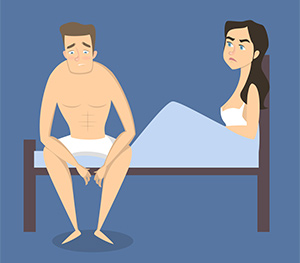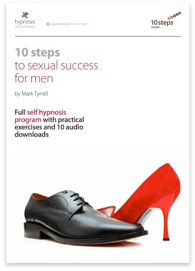4 CBT-Based Steps to Overcome Male Sexual Performance Anxiety
Guys, you can regain confidence in the bedroom, and here's how
 There are straightforward ways to reduce anxiety around sexual performance
There are straightforward ways to reduce anxiety around sexual performance"I get nervous just thinking we might have sex. It's embarrassing and humiliating. And you know what? I'm scared Cathy, my partner, thinks I don't want her. But I do. She says it's okay, but I feel like she's just trying to reassure me."
Michael's words were a variation on a theme I'd heard so often. Anxiety shrivels sexual confidence. Ecstasy between the sheets morphs into performance anxiety under the covers. Making love becomes making the grade.
For many men, feeling anxious around sex causes a loss of sexual responsiveness - an inability in the moment to form an erection.
But for Michael, sexual anxiety had a twofold effect.
Either premature or not at all
"It's weird,"he told me forlornly. "Either I get so nervous that I have premature ejaculation1 or, more often, I just can't perform at all. I hate to think of myself as having impotence.2 But that's what it is most of the time!"
Michael told me the more pressured he felt to have sex, the more he just couldn't achieve or maintain an erection. He hastened to add that the pressure came from within himself, not his partner. He said "failing to perform" made him feel like a failure as a man.
I reassured Michael that we didn't need to talk in terms of diagnosis or labelling. Premature ejaculation is a description of a situation, not the name of a disease, and bestowing the unfortunate diagnosis of 'erectile dysfunction' upon someone is sure to do more harm than good!
I made a suggestion to Michael that I thought might help:
"What you've been experiencing is simply a natural consequence of too much anxiety and stress. Any man can respond like this when stress levels get too high, when sex becomes associated with anxiety in the mind."
Indeed, it's not surprising that fear switches off sexual arousal in most people. Nature doesn't want us thinking about sex when an imminent threat is close by. The trouble is, that 'imminent threat' might be all in the mind.
It does seem kind of strange that impotence and premature ejaculation can both be related to sexual anxiety. Yet for many men, premature ejaculation - climaxing a few seconds after penetration - and impotence are two sides of the same coin.
The common denominator is emotional conditioning. We can come to associate anything, including sex, with fear rather than enjoyment. And this faulty pattern matching can happen in all kinds of situations.
How sexual anxiety is created
Electrocute a cat (except don't) every time you open a packet of food and pretty soon it will feel fearful every time you even look as though you're about to open that packet.
The cat's instinctive association with food packet opening has gone from positive expectation to fear. Emotional experience has taught the cat to produce a fear response to something that could be a good experience.
Strong anxiety, like any strong feeling, can condition us to respond in ways that don't serve us well. This is why we need to look at how the experience of sex has been in the past and also, of course, start to change the association back to one of confidence and enjoyment.
Michael told me his earliest sexual experiences as a teen had been hurried and rushed. A mix of excitement and tension. His first girlfriend's parents would often be around and not leave them alone, or they would have to "make out" in his car. So his early learning of sexual experience was associated with haste and tension.
"I've always been a bit premature," he told me sadly. Then he looked really despairing. "But this impotence is a new thing!"
The first thing I wanted to know was just what had precipitated this new and worsened sexual anxiety. Had he always been this anxious in bed, or was it new?
What, if anything, had changed in Michael's life?
Step one: Understand why the sexual anxiety began
The first step to overcoming sexual anxiety is to get to the bottom of what might be causing it. When did anxiety first rear its head in your sex life? Was it after some unhappy sexual experience? After a particularly stressful time? Or has sexual anxiety been there for as long as you can remember?
Maybe you feel as if you're the only one with a problem. And that can make matters much worse.
Male sexuality is often misunderstood and therefore trivialized. The cliché is that most men experience sex as totally disconnected from their feelings. But while that may be true of some men, emotional wellbeing and sexual happiness are closely associated for many - I'd say most - men.
So the quality of your sex life often mirrors the health, both emotional and physical, of your wider life. There are parts of life outside of sex that can produce the side effect of diminished sexual confidence and enjoyment.
Fear of getting close
Many men have worries around sex, doubts about their bodies, and sometimes fears about getting emotionally intimate. But it can work the other way too.
Sometimes guys fear losing emotional intimacy with the partner they love because of a sexual difficulty they've developed. The more they feel is at stake - the more they fear losing their partner - the more sex becomes an issue.
Some men have felt ridiculed or humiliated during sex. They might feel that getting close sexually will make them vulnerable. Perhaps they feel they'd rather not risk further humiliation and shame.
All these concerns can certainly cause doubts, fears, even despair when it comes to sex.
But it's important to always remember one thing.
You have a huge sexual organ
The cliché has it that the biggest human sex organ is the brain. But, like all clichés, we say it because it's true.
Of course sex isn't just physical. Mind and body are intricately and intimately connected. By changing the mind, we can change the way the body responds.
That's why hypnosis can be so effective. We can use hypnosis to influence the mind/body connection for better sex.
Michael had come to me for help in creating a new, more natural, more unhurried and confident association with sex. He'd used hypnosis to quit smoking, so he knew how powerful it can be. I was determined to help him.
But before we could work directly to lift the sexual anxiety itself, we needed to do something else.
Look at the basics
I asked Michael about his life generally.
Sex is a combination of the physical and emotional. First off, we needed to check out the basics. How was Michael's physical health?
It might be that sexual confidence is damaged during a time of illness or fatigue, in which it suddenly feels harder to function sexually. Physical ailments may spoil your sexual responsiveness directly, but even once the physical illness has passed there can still be a lasting knock to your confidence.
Diabetes, hypertension, depression, and the accompanying chronic tiredness and impaired blood flow can all undermine sexual function.3
Lifestyle, too, makes a huge difference. Exercise helps sexual function, like a natural Viagra,4 as does a good diet.5 On the flip side, we can surmise that inactivity and a bad diet can damage sexual responsiveness in men.
Some medications, such as antidepressants, may also disrupt male (and female) sexual responsiveness.6
One way of testing whether impotence, for example, stems from an emotional or a physical cause is to see whether you sometimes wake up in the morning with an erection. If you do, then it would seem that all is well physically.
Michael had been given a clean bill of health and was reasonably fit. He reported that he did have erections and could feel sexy sometimes - just not, he told me miserably, when he was "supposed to feel aroused!"
When I questioned him further he told me he was attracted to his partner; it was just that the pressure got too much for him in the moment.
But - and this next point is incredibly important - it's not all about what's happening in the moment.
Because sex is often a reflection of happiness or contentment on a wider level in life, we need to look at how happy you are generally.
Step two: Create space in your life for great sex
The stress of relationship problems can certainly damage your sex life. If you feel put down, belittled, or just out of step with your partner it might feel kind of weird to be making love to them. I asked Michael about his relationship and he told me it would be perfect if it weren't for the guilt he felt about his increasing sexual anxiety.
But stress within the relationship is only one part of the picture.
Great sex happens when we have the spare capacity to enjoy it. Chronic stress, whether in the form of generalized anxiety or panic attacks or caused by poor diet, insufficient or excessive exercise, cigarettes,7 terrible sleep or uncurbed alcohol use, all diminish the spare capacity we would otherwise have for good sex. So too can depression.
When we diminish stress generally, we increase our spare capacity to have great sex.
So think for a moment: How much spare capacity do you have to enjoy sex?
It may be that simply lowering general stress levels will greatly enhance your sex life. And we would all do well to seek to do this anyway.
Step three: Strengthen your sexual confidence
Michael had considered taking pills and other treatments for the sexual anxiety that was blighting him. He'd thought of taking Viagra or anti-anxiety meds, but he didn't want to "cheat" as he saw it. Besides, he'd read about side effects.
I suggested we could get him feeling calm and relaxed naturally.
I asked him if he knew about pelvic floor exercises. He looked at me blankly and said he thought it might be an Olympic gymnastics category. But when I told him about some research showing that doing these kinds of exercises help men achieve better and stronger erections and ejaculatory control,8 he was interested.
When we strengthen the 'PC' (pubococcygeus) muscle, we physically improve our capacity to achieve and maintain erection and control ejaculation. Erections become stronger and longer.
And just knowing you have exercised these muscles can enhance your sexual confidence.
I said to Michael: "Okay, imagine you are peeing and you have to stop mid flow. The little muscles that stop that flow... they are your PC muscles. If you practise squeezing them 50 times twice a day, you will start to notice a strengthening of erections, and you should also start to gain more control over when you ejaculate."
"Do I have to do this at the gym?" he joked. But of course, he could do them anywhere at any time. Even waiting in line at the store. Michael started doing his PC exercises, and you can do them too.
Now we got to the heart of the session. I wanted Michael's unconscious mind to form a new association with sex so that increased confidence would naturally feel like an integral part of the whole situation.
Overcoming sexual anxiety is a question of learning to associate sex with feeling good, relaxed, and excited. We become focused on what is happening, not what we fear might happen (or not happen). As I explained to Michael, sexual confidence is really a focus off the self - a process of losing oneself in the situation.
So how can we do this?
Step four: Get your sex mojo back with hypnosis
Michael appreciated that he needed to feel generally less stressed in his life to create spare capacity for great sex. He also liked the PC exercises and I suspected that would help his emotional response to sex as well as his physical function. But we still needed to deal with his emotional association to the prospect of lovemaking.
I wanted to test just how extreme Michael's sexual anxiety was. I asked him to close his eyes and imagine being in a situation with his partner in which he felt sex might be 'expected' of him.
Almost immediately he told me he could feel a "sinking feeling" in his stomach. The anxiety was written all over his face just from imagining being intimate with his partner. So I decided to change tack. "Okay, open your eyes, Michael. We can forget about that for the time being."
Next, I asked Michael to think of something he enjoyed, something that felt easy and totally unpressured. Eventually he told me that sometimes late at night he would play guitar "just because".
I asked him to close his eyes and get a sense of feeling "in flow" playing his guitar. I suggested that every activity needs some time to "warm up", and sex is no different. He agreed with me that it took him a few minutes to get into playing guitar.
Making love "just because"
As Michael entered a deeply hypnotic state he started to smile as he conjured up the feeling of just enjoying his guitar, being relaxed in the moment.
I then asked him to keep that relaxed, in-flow feeling - in fact, to deepen it. Then with that feeling, I asked him to "notice what it feels like to make love with your partner Cathy while having those good feelings."
I suggested there was no end result needed and that they could be making love "just because". Sex isn't (yet) an Olympic sport, nor just a way to make babies.
Michael had come to see sex as something he had to do well. It was almost as though the whole experience was just down to him. I helped him hypnotically experience feeling super relaxed with his girlfriend before and during sex.
We worked at helping him enter the state of unselfconscious flow. His unconscious mind began to powerfully associate sex with intimacy, love, and pleasure - and he started to feel comfortable taking his time to prolong the pleasure if it felt right to do so.
Michael found this incredibly useful and reported later that he felt this had made a huge difference to the way he felt during sex - like a "rediscovery". He even said that since the hypnosis he could no longer even imagine feeling anxious about sex!
Performance anxiety is a poor substitute for real pleasure and connection. It's so liberating when we rediscover the just because of lovemaking.
No more sexual anxiety
Michael was a guy who just needed a break. He'd been through some really stressful times. Fear of sex can ruin a man's sense of who he is, and that's exactly how Michael told me he felt when he first came to see me. I was happy to help.
Since then things had taken quite an upturn, so to speak.
Michael reported that they he and Cathy and spontaneously made love one afternoon and it was "like it just happened" - with no planning and certainly no stress. He also told me delightedly that the premature ejaculation had become "a non-issue" for the first time in his life.
Michael's unconscious mind had changed his response to sex. But there was more.
He even noticed that, because the old sexual anxieties had fallen away and he felt confident in bed, he started to be more confident in all other areas of his life: "It's like I feel powerful and strong, like a man again."
Evidently his partner was happier, too!
When we make positive changes in one part of life, almost inevitably other parts of life get better too. Michael had begun to feel happier not just because of his newly rediscovered sexual confidence but because his life was getting better as a whole.
He'd started to feel more hopeful about getting a new job (which he eventually did), and went back to jogging and the gym. He cleaned up his diet. We also worked on him getting better sleep.
Michael began to feel good about his body again. He gained energy and focus. His mood was better.
I re-emphasized how vital spare capacity is when working towards enjoying sex or any of life's natural pleasures, and he really took this on board.
On his third visit Michael said he not only no longer feared sex, he had started to love it. And by loving sex again, he told me, he had started to fully love his partner again - and she him.
The author, Mark Tyrrell, has created a 10-step hypnosis course called Male Sexual Success. You can read more about it here.
10 Steps to Male Sexual Success course
Why hypnosis can help you claim your right to a confident, successful sex life...
References
- Premature ejaculation affects males only and is estimated to affect 30-70% of men during their lifetime. It can occur at any age of adulthood but is most common between the ages of 18 and 30. See this overview of premature ejaculation: http://www.healthcommunities.com/premature-ejaculation/overview-of-premature-ejaculation.shtml
- Impotence, or erectile dysfunction, is one of the most common male sexual problems according to guidelines from the European Association of Urology: https://www.europeanurology.com/article/S0302-2838(10)00133-8/pdf
- https://www.auajournals.org/doi/pdf/10.1097/01.ju.0000125198.32936.38
- https://link.springer.com/article/10.1007%2FBF01541546?LI=true
- https://www.ncbi.nlm.nih.gov/pmc/articles/PMC5510347/
- https://www.ncbi.nlm.nih.gov/pmc/articles/PMC3108697/
- https://academic.oup.com/aje/article/161/4/346/92680
- https://bjgp.org/content/54/508/819.short







